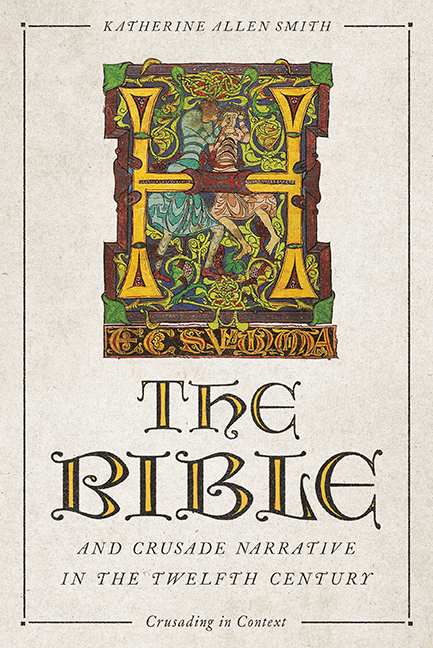Book contents
- Frontmatter
- Contents
- Acknowledgements
- List of Abbreviations
- Introduction
- Chapter 1 History and Biblical Exegesis in the Latin West
- Chapter 2 The Bible in the Chronicles of the First Crusade
- Chapter 3 Into the Promised Land
- Chapter 4 Babylon and Jerusalem
- Conclusion
- Appendix 1 Tables and Charts of Biblical References
- Appendix 2 List of Biblical References in the Texts
- Bibliography
- Index
Chapter 1 - History and Biblical Exegesis in the Latin West
Published online by Cambridge University Press: 26 April 2020
- Frontmatter
- Contents
- Acknowledgements
- List of Abbreviations
- Introduction
- Chapter 1 History and Biblical Exegesis in the Latin West
- Chapter 2 The Bible in the Chronicles of the First Crusade
- Chapter 3 Into the Promised Land
- Chapter 4 Babylon and Jerusalem
- Conclusion
- Appendix 1 Tables and Charts of Biblical References
- Appendix 2 List of Biblical References in the Texts
- Bibliography
- Index
Summary
In about 1107, before Baldric of Bourgueil (d. 1130) began to circulate his history of the First Crusade, he sent a draft to his friend Peter, abbot of Saint-Pierre, Maillezais, for the latter to read and amend. If Baldric was truly looking for an editor, Peter was a natural choice; while Baldric was an armchair historian, Peter was a well-known crusade preacher and veteran of the expedition to Jerusalem. It may be more surprising to modern readers that Baldric framed his request in terms not only of deference to Peter's personal experience of the holy war, but also admiration of his friend's abilities as a biblical exegete and their shared interest in scriptural study. He reminds Peter how “recently, in your room, you showed me some expository glosses (glossulas exposituras) on the Pentateuch … whose author you did not name. This work pleases me, because it explains the meaning of the [biblical] words, and makes clear anything that might seem obscure.” Baldric went on to beg Peter (who was probably the modest ‘anonymous’ author of the glosses) to have this text copied for him, and offered in exchange the “little book (libellum) which [he] had composed on the journey to Jerusalem to be amended” at Peter's discretion. The implication is that Peter's fitness to evaluate Baldric's history depended as much, or more, on his skill at deciphering the mysteries of the sacred page as on his personal experience of the expedition to Jerusalem. More broadly, the exchange Baldric proposes – a work of history for a work of biblical exegesis – reminds us that both kinds of texts shared the goal of clarifying the often obscure workings of divine providence. It also indicates that medieval readers admired many of the same qualities in both genres; in his reply to Baldric, Peter praised his friend's history for the “sweetness” and “elegance” of its language, as well as its “wisdom,” echoing Baldric's evaluation of the glosses as “neat,” “elegant,” and “enlightening.”5 Finally, this exchange suggests that in the early twelfth-century Latin West there was considerable overlap between the readers and practitioners of exegesis and history, who would have been unlikely to distinguish between these genres as neatly as modern scholars do.
- Type
- Chapter
- Information
- The Bible and Crusade Narrative in the Twelfth Century , pp. 15 - 48Publisher: Boydell & BrewerPrint publication year: 2020

